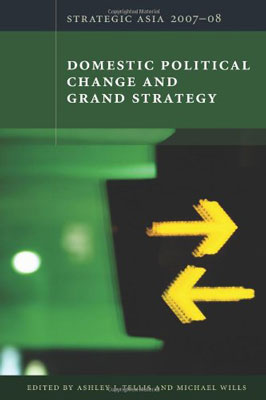Source: The National Bureau of Asian Research
 Edited by Ashley Tellis, with contributions by leading Asia specialists including Frederic Grare of the Carnegie Endowment for International Peace, this book, the seventh in NBR's strategic Asia series, examines the varied political transitions and internal changes occurring in pivotal Asian states and evaluates the impact on Asian foriegn policymaking and strategy. Through a combination of country, regional, and topical studies, the book assesses the patterns of political development, the drivers of internal change, and character of governance, and prospects for political stability in the region, and draws implications ofr Asia and the United States.
Edited by Ashley Tellis, with contributions by leading Asia specialists including Frederic Grare of the Carnegie Endowment for International Peace, this book, the seventh in NBR's strategic Asia series, examines the varied political transitions and internal changes occurring in pivotal Asian states and evaluates the impact on Asian foriegn policymaking and strategy. Through a combination of country, regional, and topical studies, the book assesses the patterns of political development, the drivers of internal change, and character of governance, and prospects for political stability in the region, and draws implications ofr Asia and the United States.
Order this book, or read the introduction by Ashley J. Tellis for free.
Ashley J. Tellis, Senior Associate at the Carnegie Endowment for International Peace, served in the U.S. Department of State as senior advisor to the Ambassador at the U.S. embassy in India and on the National Security Council staff as special assistant to the president and senior director, strategic planning and Southwest Asia. He is the author of the books What Should We Expect of India as a Strategic Partner? and India's Emerging Nuclear Posture, as well as the editor of Strategic Asia 2006-07: Trade, Interdependence and Security, Strategic Asia 2005-06: Military Modernization in an Era of Uncertainty, and Strategic Asia 2004-05: Confronting Terrorism in Pursuit of Power.
Michael Wills is director of the Strategic Asia program at the National Bureau of Asian Research.





